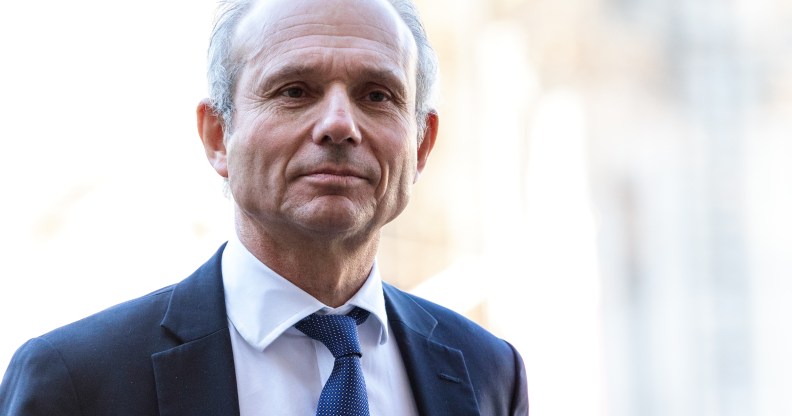Who is David Lidington? Tory with anti-gay voting record tipped to replace PM

LONDON, ENGLAND – JANUARY 31: Conservative politician David Lidington arrives for a memorial service for Conservative Peer Lord Carrington at Westminster Abbey on January 31, 2019 in London, England. Peter Carington, 6th Baron Carrington held the positions of Secretary General Of NATO, Foreign Secretary, Defence Secretary High Commissioner to Australia, First Lord of the Admiralty among others during his career that spanned seven decades. He was Foreign Minister during the Falklands War and resigned having failed to foresee the Argentinian Invasion. Educated at Eton and the Royal Military College, Sandhurst, his political career was preceded by military service where he fought in the 2nd World War for which he received a Military Cross. He died on the 9th July 2018. His son, also Lord Carrington, has replaced his father in the House of Lords. (Photo by Jack Taylor/Getty Images)
A number of media reports claim that politician David Lidington, who has a long record of voting against gay rights, is set to replace prime minister Theresa May, who is under pressure to quit over her handling of Brexit.
Lidington, who has been MP for Aylesbury since 1992, is rumoured to be lined up for taking on the role of acting prime minister according to reports in national newspapers, including the Guardian, The Sunday Times, and Sky.
However, the 62-year-old politician, who voted for Britain to remain in the EU, told the BBC on Sunday that he does not have “any wish to take over from the prime minister.”
He dismissed the “far-fetched speculation,” and said that he is “100 percent” behind the prime minister.
David Lidington: I don’t have any wish to take over from the prime minister
Lidington took on the role of Minister for the Cabinet Office in January 2018, following a cabinet reshuffle.
“I don’t think that I have any wish to take over from the prime minister.”
—David Lidington
The position makes him May’s de facto deputy prime minister.
Tory MP David Lidington has long history of opposing LGBT+ rights
But Lidinton, an Anglican Christian, has a history of voting against LGBT+ rights, according to public voting record website TheyWorkForYou.
In 2013, he twice voted against same-sex marriage and, in 2004 , he voted against civil partnerships.
And, in 2003, the politician voted to retain the controversial Section 28, which was introduced under the Thatcher government in 1988.
This clause, repealed across the whole of the UK by 2003, banned local authorities, including schools and councils, from “promoting” homosexuality.

Lidington is tipped to replace Theresa May if she resigned as prime minister. (Dan Kitwood/Getty Images)
In 2002, he voted against allowing same-sex couples to adopt children.
The MP, whose captained his Cambridge University team to victory in University Challenge in 1979, also voted three times in 1999 against equalising the age of consent for homosexual acts to 16 from 18.
In February 2013, Lidington released a statement saying he opposed equal marriage, while admitting that he was “mistaken” to have voted against civil unions.
“The essential nature of marriage in this country and in Europe as a whole has been as a public institution that binds together one man and one woman, exclusively and permanently,” he said at the time.
“Its purpose is not only to provide mutual love and commitment but also for the procreation and care of children.”
Regarding civil partnerships, Lidington said: “I wanted to reflect particularly carefully before deciding what to do, partly because I voted in the past against the creation of civil partnerships for gay couples but I now believe that that decision to have been mistaken.”

